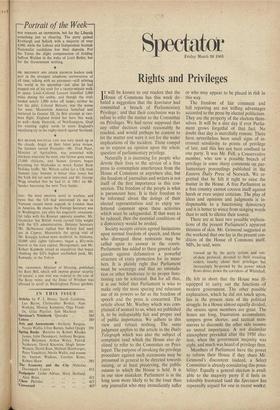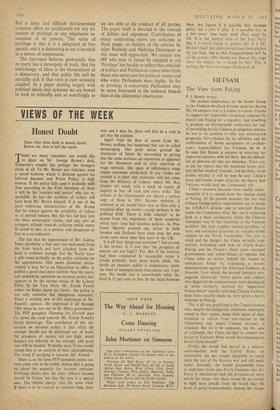Rights and Privileges
T will be known to our readers that the IHouse of Commons has this week de- bated a suggestion that the Spectator had committed a breach of Parliamentary Privilege: and that their conclusion was to refuse to refer the matter to the Committee on Privileges. We had never supposed that any other decision could reasonably be reached, and would perhaps be content to let the matter rest were it not for the wider implications of the incident. These compel us to express an opinion upon the whole question of parliamentary privilege.
Naturally it is incensing for people who devote their lives to the service of a free press to contemplate interference from the House of Commons or anywhere else, but the freedom of journalists and writers is not itself of the first importance in this con- nection. The freedom of the people is what is paramount here. It is their freedom to be informed about the doings of their elected representatives and to enjoy un- fettered comment upon these activities which must be safeguarded. If that were to be reduced, then the essential conditions of a democracy would be eroded.
Society accepts certain agreed limitations upon normal freedom of speech, and those who disregard these restraints may be called upon to answer in the courts. Parliament has added to these general safe- guards against defamation a powerful structure of extra protection for its mem-• bers. It is plainly right that Parliament must be sovereign and that no intimida- tion or other hindrance to its proper func- tioning can be tolerated. But for all that, it is our belief that Parliament is wise to make only the most sparing and reluctant use of its powers so far as the freedom of speech and the press is concerned. The article about Mr. Warbey which was com- plained of seemed to us, when we published it, to be indisputably fair and proper and of public importance. We adhere to this view and retract nothing. The same judgment applies to the article in the Daily Telegraph which was also the subject of complaint (and which the House also de- clined to refer to the Committee on Privi- leges). The purpose of invoking the privilege procedure against such statements may be presumed in general to be directed towards raising, or at least preserving, the public esteem in which the House is held. It is in our view mistaken. Parliament is in the long term more likely to be the loser than any journalist who may immediately suffer or who may appear to be placed in risk in this way.
The freedom of fair comment and full reporting are not trifling advantages accorded to the press by elected politicians. They are the property of the electors them- selves. It will be a dire day if ever Parlia- ment grows forgetful of that fact. No doubt that day is mercifully remote. There have nevertheless been small signs of in- creased sensitivity to points of privilege of late, and this has not been confined to one party. It was Mr. Fell, a Conservative member, who saw a possible breach of privilege in some sharp comments on par- liamentary proceedings published in the Eastern Daily Press of Norwich.. We re- gretted that he felt it right to raise the matter in the House. A free Parliament in a free country cannot cocoon itself against harsh or even unjust criticism. The play of ideas and opinions and judgments 'is in- dispensable to a functioning democracy and it is better to wince from stinging words than to seek to silence their source.
There are at least two possible' explana- tions of the present Parliament's apparent thinness of skin. Mr. Grimond suggested at the weekend that.one lay in the present con- ditiOn of the House of Commons itself. MPs, he said, were trussed up by the party system and out- of-date protocol, devoted to their standing orders, touchy about their privileges but increasingly by-passed by the power which flows direct down the corridors of Whitehall.
He felt in short that the House was ill- equipped to carry out the functions of modern government. The other possible explanation, which he did not touch upon, lies in the present state of the political struggle. In a House almost equally divided, the strains upon members are great. The hours are long, frustration accumulates, tempers grow shorter, and tactical man- oeuvres to discomfit the other side assume an unreal importance. A not dissimilar atmosphere prevailed after the 1950 elec- tion, when the government majority was eight, and much was,heard of privilege then.
Members of Parliament have the power to reform their House if they share Mr. Grimond's discontent (indeed, a Select Committee is already considering this possi- bility). Equally a general, election is avail- able to the majority party if it feels in- tolerably frustrated (and the Spectator has repeatedly argued for one in recent weeks). But a tense and difficult parliamentary situation offers no justification for any ex- tension of privilege or any impetuous in- vocation of its powers. 'The value of privilege is that it is a safeguard of free speech, and it is distressing to see it invoked as a means of suppression.
The Spectator believes profoundly that no: party has a monopoly of truth, that the interchange of ideas is the bloodstream of a democracy, and that public life will be mortally sick if that view is ever seriously assailed. In a paper dealing largely with political ideals and opinions we are bound to look as critically and as searchingly as we are able at the conduct of all, parties. The paper itself is devoted to the concept of debate and argument. Contributors of many contrasting views are welcome in these pages, as readers of the articles by Alan Watkins and Nicholas Davenport in this issue will appreciate. We entreat any MP who may in future be tempted to cry Privilege' too hastily to reflect that criticism of politics and Parliament comes'often from those who most care for political causes and who value Parliament most highly. So far as privilege is 'concerned, Parliament may be more honoured in the notional breach than in the deferential observance.















































 Previous page
Previous page